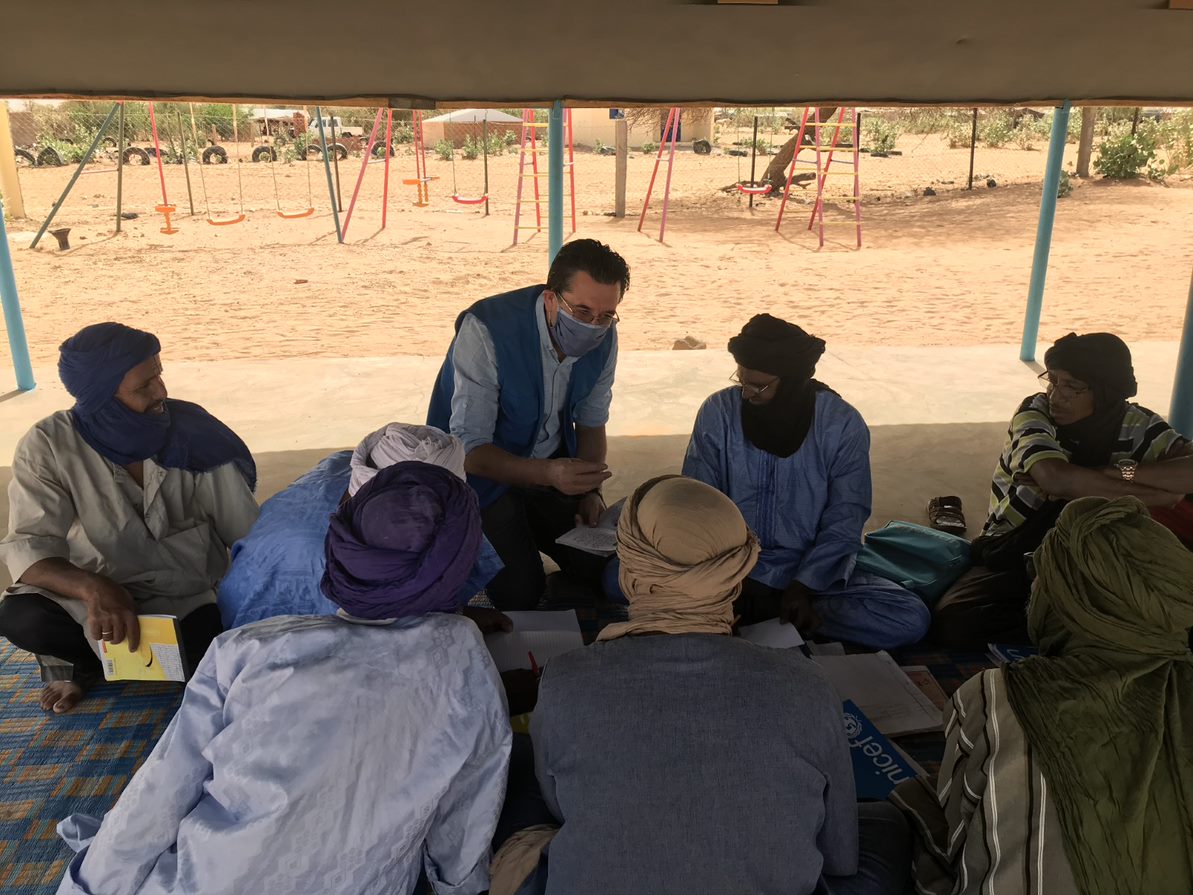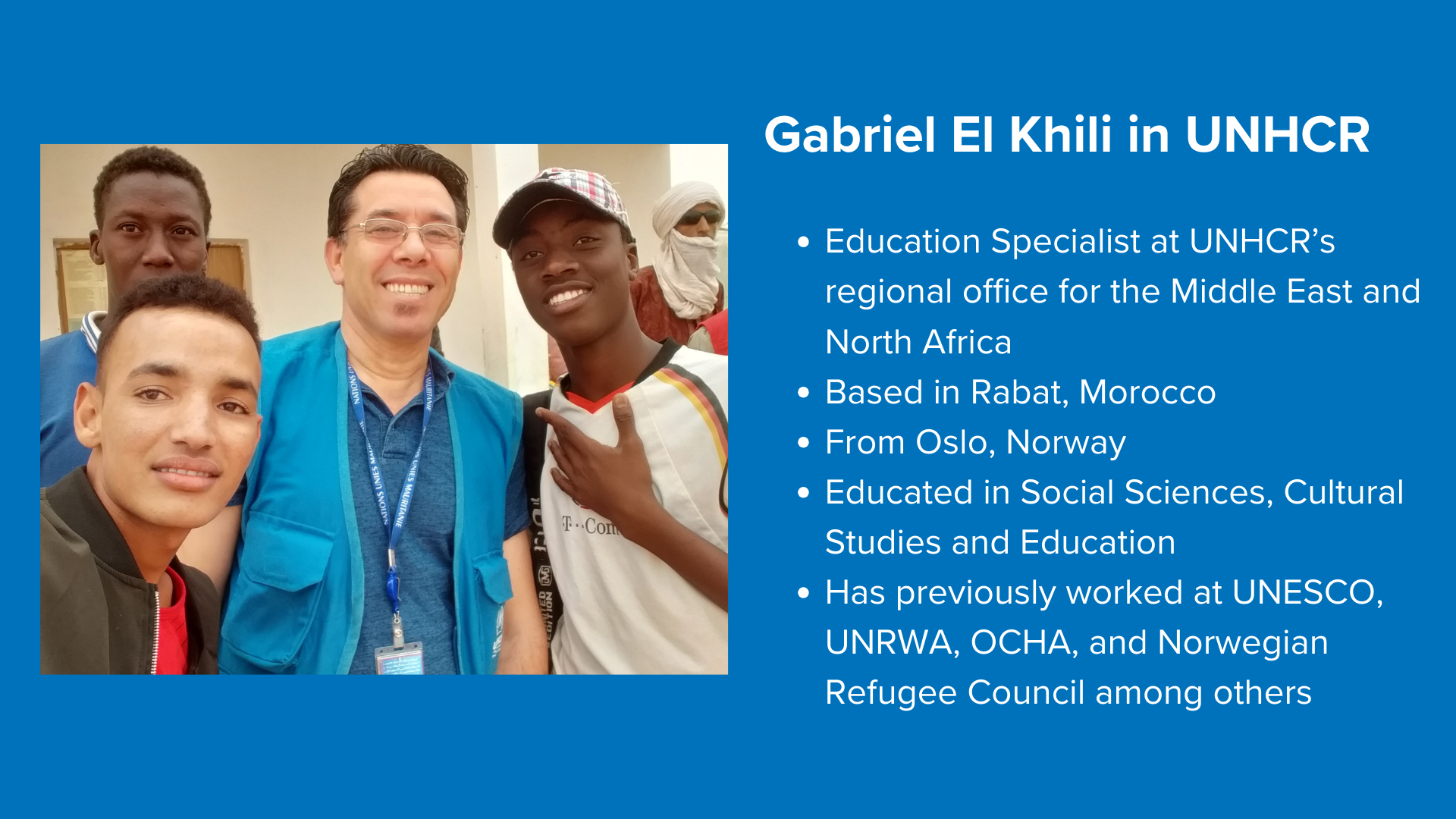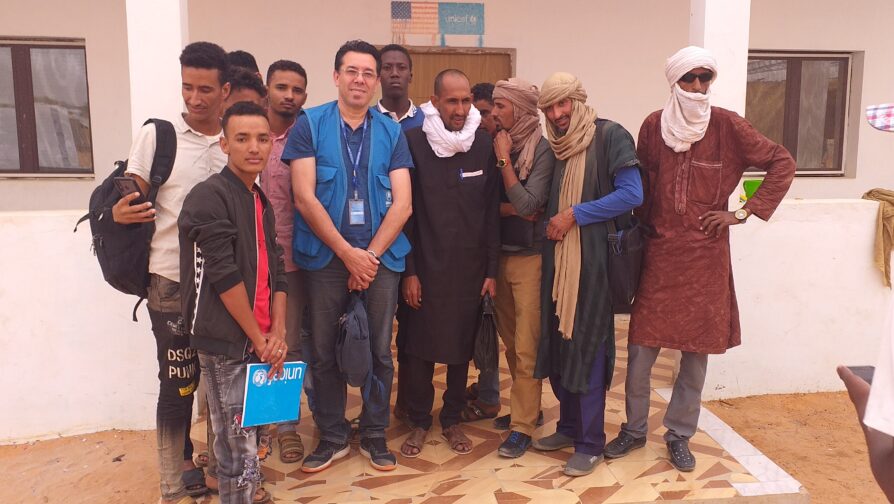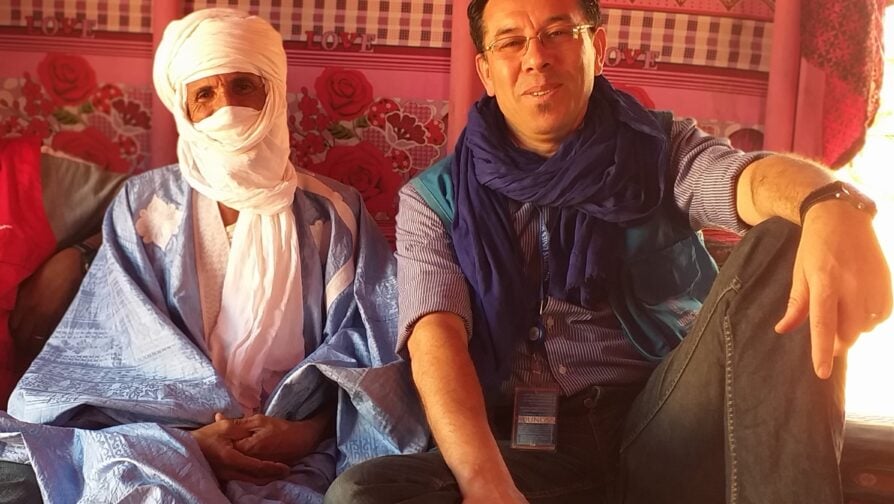
Gabriel El Khili with teachers and head of schools under a training workshop in Mberra Camp, Mauritania.

Why did you choose to join UNHCR?
“I believe education can make a change. Different countries that have invested into education have experienced tremendous results – the Scandinavian system of education is something we should be proud of, and that’s what we are trying to be inspired by as a model. For UNHCR, education is the answer, and it is a priority too, as it is a powerful protection tool and motivator for children and young people to pursue their dreams and develop their resilience. This is exactly what motivates me and makes me appreciate my mission in Mauritania, with refugees from the Sahel region.
I moved to international co-operation and international development after working in the private sector in Scandinavia. I chose to work with the UN agencies by conviction, based on solidarity and humanitarian-driven objectives.”

Gabriel El Khili with youth from Mberra Camp, Mauritania.
How would you describe your work?
“When you are working with an operation, you work with the day-to-day case management; when you work with a regional office, that represents multiple countries, you are both focused on policy, like you would be in the UNHCR headquarters, and on developments and activities in each country in the region. I appreciate working in this position because it allows me to keep up with what is going on in the ground, but also deal with strategic work. I am still doing missions to meet with local communities. I just got a request to go to Mauritania and a couple of months ago I went to Tunisia, and I am also supporting the local team in Morocco. With the UNHCR Regional Bureau for the Middle East and North Africa based in Amman, my work is mainly technical support, helping the operation in the North-Africa sub-region to do the day-to-day work and so on.
Mauritania is the only stable country in the Sahel region, and so many refugees are fleeing there. This is why there is a huge camp in eastern Mauritania hosting around 100,000 people. From 2020 until today, UNHCR, in collaboration with other UN agencies, partners, the Mauritanian government and the refugees themselves, has been working on how to include refugees into the national education system. This is a very heavy process, but it provides a tremendous change in providing opportunities for refugee children to be integrated in the country both academically and socio-economically. Before, the children in the camp were following their national Malian curriculum, but from next year they will be following the Mauritanian national curricula, providing them a chance to better integrate in their country of asylum while keeping their own identity.
Another rewarding aspect of my work is working to build skills and capacity of the Ministries of Education, partners and UNHCR staff in the field. We are also working on a program targeting out-of-school children, which is important in every country in North Africa.”
Can you share some of your best experiences from working for UNHCR?
“The process of inclusion of refugees in national systems is one of the major challenges in the field of refugee education, but it is also rewarding. It’s not only about granting access to education, but also providing quality education and perspectives. Oftentimes refugee children are excluded from education in their countries of asylum for many reasons: language barriers, social background, lack of documentation, to name a few. In UNHCR we work with both national authorities, donors, and international organizations to make sure refugee children and youth are included in the national education systems and have a place in the country.
UNHCR, UNICEF and UNESCO have also developed a comprehensive program with different ministries to put in place a major project targeting out-of-school children to integrate them into the national public education system or providing vocational training and/or job opportunities.
Another achievement that I am very happy with is to have been able to put in place a distance learning program for homeschooling during the Covid-19 pandemic, in the Mberra refugee camp (some 1,400 km from the capital of Mauritania). We developed a dedicated curriculum, trained teachers, and heads of schools, and involved parents and refugee community at large: homeschooling is not an easy task, and oftentimes parents have never been to school themselves, so it is very challenging. As we say here, Alhamdulillah [Arabic for ” thanks God”], eventually the children took their exams and passed the year. That was a tremendous experience since we managed to launch an innovative approach to education, but also very low-tech having to rely only on the existing rudimentary infrastructure.
Now, we have also managed to create a connectivity center in the camp of Mberra for pupils, teachers, and youth. As far as I know, that is the only center you can find in the whole of the Sahel region.”

Gabriel El Khili with the Mberra Camp coordinator (Momo).
What are some of the most difficult experiences you have had working for UNHCR?
“The challenges are many – but you cannot move ahead without them.
First, the environment: when working in the Sahel region, I am confronted with obstacles linked to the harsh environment and underdevelopment, poor infrastructure, challenges related to equity and quality of education in terms of recruiting teachers, very outdated curricula and pedagogical approaches, a non-competency oriented system – and, of course, poverty, which is a challenge for both the children and the education system itself. Funding is also an issue. You can kickstart a project, but due to financial reasons, often it will not be sustained and scaled up.
Due to the harsh environment, there is a high turnover of staff in the field. Often, people come for a year or two, so the effort needs to be doubled to maintain institutional capacity and memory. There are also systemic problems: the legislation, language barriers, discrimination etc. It is a harsh and hostile environment in remote areas that affected UNHCR staff daily work and life. That means that qualified people are often hesitant to go there, but I have decided to stand with refugees and carry on the work!”
”Stories from the Field” is an interview series providing insight into the daily lives of some of our Nordic and Baltic colleagues, working for the organization all over the world. Read our previous interviews here.
UNHCR, the UN Refugee Agency, is present in 135 countries and territories around the world, helping men, women and children who have been forced to flee from their homes due to war, violence and persecution. Our headquarters are located in Geneva in Switzerland, but the vast majority of our employees work in the field and in the places in the world where the majority of the world’s refugees are situated.
Learn more about UNHCR’s work here.
Share on Facebook Share on Twitter